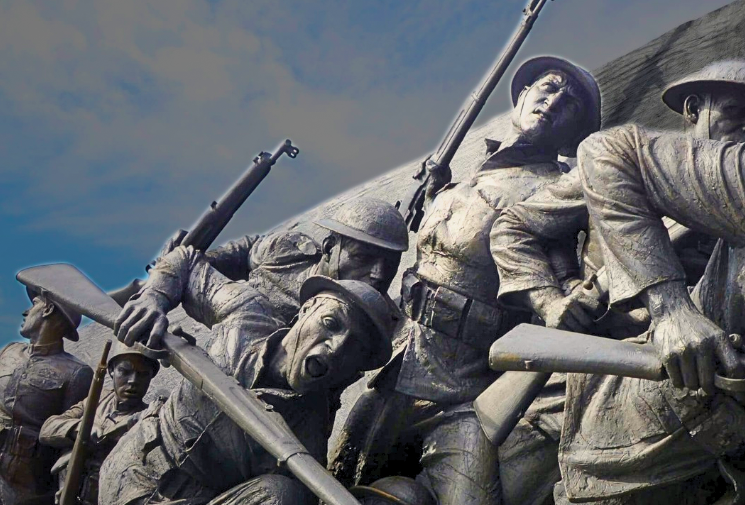The Death of Politics:
How to Heal Our Frayed Republic After Trump
By Peter Wehner
(HarperOne, 2019)
Believe Me: The Evangelical Road to Donald Trump
By John Fea
(Eerdmans, 2018)
At the Summer 2019 National Conservatism Conference, Yoram Hazony framed definitions of national identity with theology. “You throw out Christianity, you throw out the Torah, you throw out God, and within two generations people can’t tell the difference between a man and a woman,” he said. “They can’t tell the difference between a foreigner and a citizen, they can’t tell the difference between this side of the border and the other side of the border.”
If you look at evangelical critics of President Trump and his administration’s immigration policies, you know that Hazony’s assertion stumbles over theists—Christians, even—who are reluctant to draw a distinction between American citizens and Central Americans seeking a home in the United States. Some of this reluctance is based on heartfelt opposition to a crass and narcissistic president. But it also reflects a basic evangelical tendency. Ever since the eighteenth-century awakenings that George Whitefield and Jonathan Edwards made famous, the personal holiness that is supposed to accompany genuine conversion has posed a large obstacle to moral compromise. As much as moralism has afflicted religious politics in the United States, evangelicals suffer from a strain of prissiness that outdistances most other believers who make America their home.
Recent books by John Fea and Peter Wehner display this evangelical idealism. They are remarkably useful for understanding how broad swaths of American Protestants assess not simply the presidency of Donald Trump but the history and character of the United States. Both authors are laymen in evangelical churches and have no professional standing as church officials. But both writers are also experts in professions that encourage members to make judgments about American politics and society. Fea teaches U.S. history at Messiah College, an evangelical liberal arts school in central Pennsylvania, and Wehner has been a staffer in three Republican presidential administrations and is now a senior fellow at the Ethics and Public Policy Center.
These credentials distinguish Fea and Wehner from the ordinary evangelical in the pew. At the same time, both authors vehemently critique President Trump and the evangelicals who voted for him on grounds that rely little on the expertise that comes with historical inquiry or political experience. Instead, they rely on the moralistic squint that born-again Protestants have made a trademark of Christian devotion.
Standard histories of the Christian right start with the anti-communism of preachers like Carl McIntire and Billy James Hargis. Their so-called ministries during the 1940s and 1950s tapped alarm in the United States over communism that also fueled the conspiratorial outlook of the John Birch Society. The rise of today’s social conservatism is distinct from those sources of anti-communism. Falwell’s Moral Majority, founded in 1979, was the first clear manifestation of the GOP’s outreach to conservative Protestants (also known as fundamentalists and evangelicals—the difference put colloquially is that fundamentalists are angry evangelicals). Pat Robertson’s 700 Club became the platform for the Christian Coalition and his 1988 run for the presidency.
During the Cold War, social conservatives were decidedly hawkish. But in the context of the culture wars, these Protestants rallied under the banner of “family values” by opposing abortion, gay marriage, sexual liberation, and some forms of feminism. The New Christian Right was decidedly moralistic, at least with regard to family and sex, in ways that the Old Christian Right had not been—in the 1950s almost the whole spectrum of American politics was family-friendly. This ethical imperative also meant voters should support candidates who were men of character and who would stem the tide of secularization.
The irony of this evangelical political genealogy is that Fea and Wehner do not see themselves in it even as they identify with born-again Protestantism. In fact, neither author inspects the affinity between evangelicalism and a certain strain of conservative moralism. Instead, both write out of a sense of alarm over the way white evangelicals supported Donald Trump in the 2016 election.
Wehner starts from the perspective that politics is a noble calling. It is a short step to his second point that “Trump is precisely the kind of person our system of government was designed to avoid, the type of demagogic leader our founders feared.” The Constitution is actually silent about character, but for Wehner personal integrity is a litmus test. Yet Christians with any sense of original sin know that all humans not born of a virgin fail that test.
Fea also writes from the immediate context of Trump’s presidency. He recalls how Trump fumbled while trying to convince evangelical voters he is a Christian, mentioning “Two Corinthians” instead of “Second Corinthians.” Fea also catalogs Trump’s “decidedly un-Christian behavior”—from mocking his competitor’s “small genitals” to the “locker-room talk” caught on tape to prove that Trump is not a Christian. Never mind that Jesus took flack for hanging around with people whose reputations were comparable to Trump’s.
Fea could not believe that evangelicals supported such a man. When the election returns came in, Fea writes, “I was shocked. I was saddened. I was angry.” Fea was particularly mad not at Trump but “my fellow evangelicals.”
Of course, the 2016 election took most observers by surprise. That evangelicals supported Trump at such high levels was a development no one who studies the history of American Protestants saw coming. But if you want experts with in-house knowledge of the evangelical world to reflect on and try to account for the evangelical vote, you need to look beyond these books. Fea and Wehner use their platforms to show that they are not the kind of evangelical that would vote for Trump. The reason is similar to the logic that held the Moral Majority together: to support Donald Trump is immoral and therefore a betrayal of Jesus.
Both authors converge on the role of fear and coveting power in explaining evangelical support for Trump. Fea relies most on fear. He arranges an overview of Protestant politics in the United States around “A Short History of Evangelical Fear.” This includes Puritan fright of native Americans, evangelicals’ anti-Catholicism, white Protestant racism, and theological trends that reinforced a Manichean view of the world. This side of evangelical politics is unbecoming and un-Christian, according to Fea. He reminds readers that Jesus told his followers that they should not fear contemporary circumstances but trust God.
Resentment and Loss
Wehner echoes Fea by arguing that evangelicals supported Trump because they feared a loss of “status and influence.” He adds, “A sense of resentment, or a ‘narrative of injury,’ is leading some evangelicals to look for scapegoats to explain their growing impotence.” Fear may be what motivated the rank-and-file evangelicals, but lust for power was what drove those Fea calls “court evangelicals”—pastors and leaders who had access to Trump. These figures have sold their souls to gain the president’s ear.
If their explanations of evangelicals’ political behavior rely on moral judgments and psychological speculation, Wehner’s and Fea’s prescriptions for improvement are equally devout. Wehner’s solution for, as the subtitle puts it, healing “our frayed republic after Trump” is arguably the most explicitly Christian and consequently least plausible. He lists four aspirations: doing what Jesus would do; adopting a “coherent vision of politics” informed by evangelicals’ “moral vision of justice and the common good”; embracing attitudes of understanding, reconciliation, gratitude, and love; and treating everyone as “neighbors.” As much as these points echo a Sunday school lesson, Wehner has read enough to tie them to Augustine’s two cities, Roman Catholic social teaching, C. S. Lewis’s esteem for wonder and enchantment, and Jesus’s parable of the Good Samaritan.
To his credit, Wehner brings up the Iraq War, which he supported and for which he wrote speeches in the Bush II administration. Here he reminds readers that politics is not easy. Wehner acknowledges that the war was a mistake with “grave” consequences. But at the time, “arguments for war outweighed the arguments against it.” Readers may wonder if asking what Jesus would do was part of the Bush administration’s calculation about Iraq. The answer is likely no. That is no proof that Wehner’s book is flawed, but suggests that Christian aspirations will not remedy what ails American politics.
Fea is no less circumspect than Wehner in expressing Christian remedies. Fea recommends that evangelicals become humble the way that black church leaders did during the civil rights movement. African American church leaders never “spoke the language of hate or resentment.” The rank-and-file were “people of humble means who lived ordinary lives in ordinary neighborhoods.” In fact, Fea writes, “it is nonsensical to talk about the civil rights movement in terms of political power.”
That claim may make some sense of African Americans’ daily experience but not of the movement’s political achievement—namely, securing the vote and electing African Americans at the state and federal levels. Even so, Fea’s contrast between white and black evangelicals supports his contention that if white evangelicals had pursued humility, they would have achieved what sociologist James Davison Hunter has called “faithful presence.” Fea thinks evangelicals would be better off if they stopped “fighting the culture wars and pursue[d] a course of ‘faithful presence’ in their local communities and neighborhoods.” If African Americans had done that, the United States might well have remained segregated. Fea’s point, though, is not really historical or political. It is about personal sanctity.
That is a position, ironically, that has resonance within elite institutions across the United States. Editors at the Washington Post, professors at Princeton University, and Hollywood stars would have little trouble agreeing with Wehner’s and Fea’s spiritual rectitude, at least when it comes to the current White House. Such a broad consensus suggests that recognizing the evils of Donald Trump has little to do with being born again.
Yet Wehner and Fea remain convinced that their opposition to Trump and his supporters is spiritual. That conviction says more about evangelical habits of reflection than it does about either the way people govern (Wehner’s expertise) or the history of born-again Protestants (Fea’s scholarly niche). Evangelicals do not isolate professional responsibilities from religious conviction. A goal among evangelicals for at least the past forty years has been to integrate the personal and professional spheres. To have one standard for work and another for devotion is a recipe for hypocrisy.
The Eschaton Can Wait
That is not the only way of considering religious integrity and political life. From Augustine on, many Christian thinkers have recognized that political rule in the fallen world requires standards different from the church’s norms. From an Augustinian perspective, the kingdom of God is not “of this world” but exists in the hearts and minds of believers while gaining coherence in a transcendent, mystical body—the church. Conversely, the political realm is merely a means for achieving a measure of order and peace in a world dominated by sin.
The difference between the church and the state lowers hopes for enacting justice in this world and raises them for the world to come, the eschaton. But evangelicals typically immanentize the eschaton. That is, they try to realize the ideals of the world to come in the here-and-now. Politics becomes a means for doing so.
Of course, evangelicals are not the only believers to identify this world with the hereafter. Roman Catholics and other Protestants also have struggled with Augustinian realism. But evangelical Protestants are arguably the loudest immanentizers in the United States. Indeed, their prominence in electoral politics since 1980 has depended on the case that political involvement or activism is truly part of the pursuit of holiness.
It is a habit that is hard to kick even when it works out badly. Two decades ago, when evangelical moralism was fueling impeachment proceedings against Bill Clinton, Andrew Sullivan complained about the Christian right’s “remoralization of conservative politics.” “It is an orthodoxy,” he wrote, of “cultural and moral revolution: a wholesale assault on the beliefs and practices of an entire post-1960’s settlement.” Wehner and Fea might be glad to be part of another iteration of that revolution because the corruptions of Trump as a man and a president are so grave. But their disgust with Trump does little to instruct their evangelical readers about the nature of politics or historical judgment.
Their shared moralism also renders them much more similar to the evangelical rank-and-file than they imagine. If they had taken cues from Augustine, not only about the City of Man but also about the ironies of providence, they might have echoed Reinhold Niebuhr, a theologian who is a favorite even of Democrats. The Niebuhrian perspective instructs that God’s ways are not ours, his victories sometimes bring loss for believers, and the faithful’s victories are sometimes at odds with divine will.
As it stands, Wehner and Fea only reinforce conservative Protestants assumptions. They missed an opportunity to prepare evangelicals for a post-Trump America, when the kind of scorn that Sullivan directed at Ken Starr, Jerry Falwell, and James Dobson will likely boomerang on today’s moralizers.
D. G. Hart teaches history at Hillsdale College and is the Novakovic Fellow at the Foreign Policy Research Institute.
Founded in 1957 by the great Russell Kirk, Modern Age is the forum for stimulating debate and discussion of the most important ideas of concern to conservatives of all stripes. It plays a vital role in these contentious, confusing times by applying timeless principles to the specific conditions and crises of our age—to what Kirk, in the inaugural issue, called “the great moral and social and political and economic and literary questions of the hour.” Subscribe to Modern Age »













